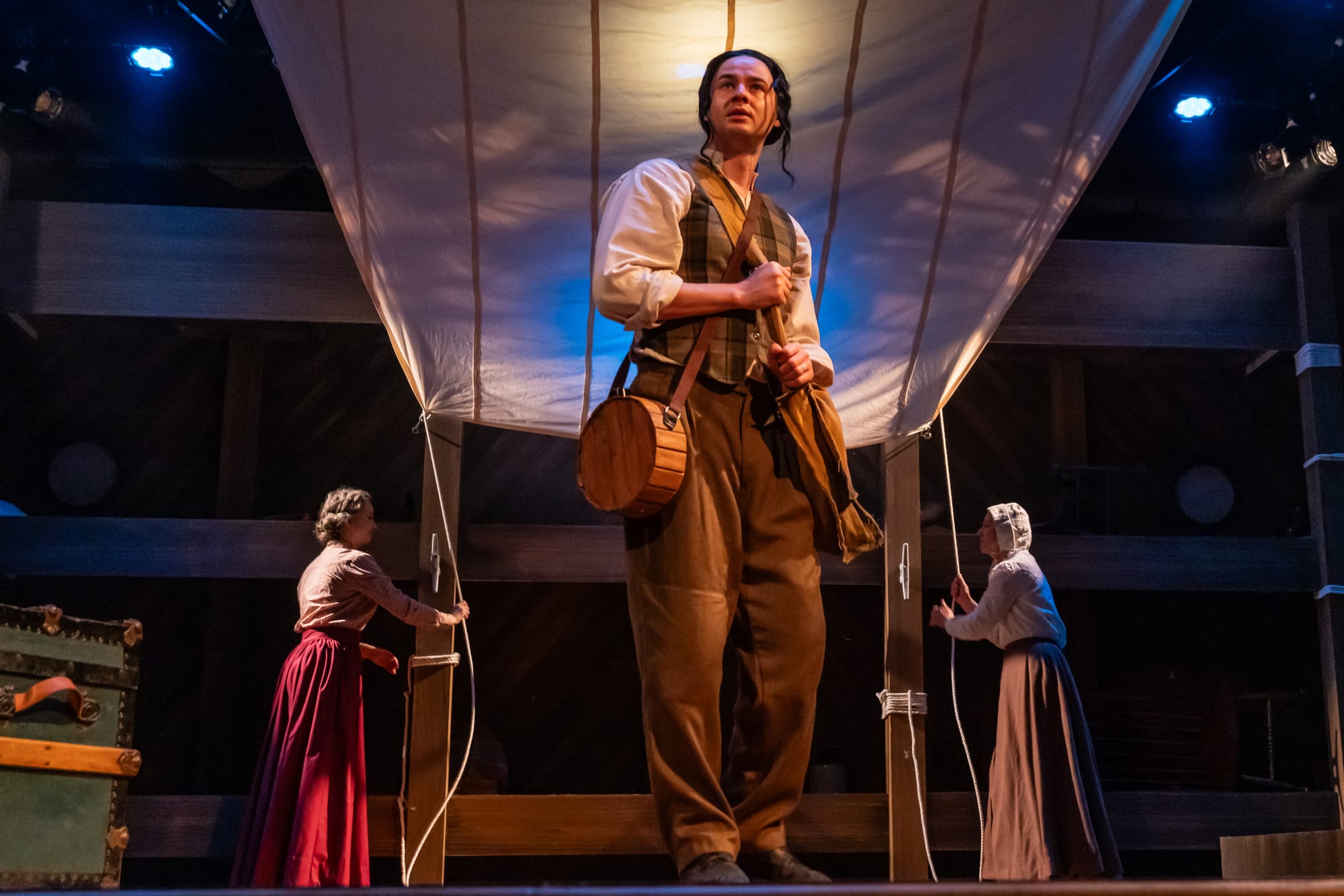Bonus Canada Day post: My first trip to the Blyth Festival
I review the world premiere of Emma Donoghue's The Wind Coming Over the Sea and a revival of Drew Hayden Taylor's Sir John A: Acts of a Gentrified Ojibway Rebellion

I’m not sure why I had never visited the Blyth Festival before. The long-running theatre festival is mostly devoted to Canadian works and has premiered dozens of new plays, including Anne Chislett’s Governor General’s Award-winning Quiet in the Land (which is being remounted there this month), Beverley Cooper’s Innocence Lost: A Play About Steven Truscott, and Marie-Beath Badian’s Prairie Nurse.
The big draw for me this season was the world premiere of novelist Emma Donoghue’s The Wind Coming Over the Sea (Rating: ✭✭✭), a new folk musical that integrates material from the letters of real-life couple Jane and Henry Johnson (played by Shelayna Christante and Landon Doak) with traditional Irish and British folk tunes.
During the Irish famine of the 1840s, Henry left their impoverished small town in Northern Ireland to find a future in the new world. The plan was to establish himself — to “find a situation,” as the expression went — and then bring Jane and their two children over. It is, of course, a familiar story that has played out — that continues to play out — all over the world.
In America, Henry encounters an anti-immigration backlash, hearing phrases like “Irish fever,” “You people!” and “Up to me, I’d build a wall”; this last statement got uneasy laughs during the show’s opening performance — for obvious (and depressing) reasons.
Henry can’t find work. What’s worse is that the reference/referral he had from a man of standing in Ireland was for someone who had since passed away. He drinks away his troubles, until he decides to give up alcohol altogether and join the temperance union. Meanwhile, Jane gets ready to set sail for Canada herself.

I don’t want to spoil the plot, such as it is. But one of my main issues with the play is that we barely get to know Henry and Jane before they’re separated. And so, their years-long attempt to reunite doesn’t mean as much or hit with as much emotional force as it could. In addition, there’s a lack of momentum and a vagueness about the setting (it’s hard to tell at times if we’re in America or Canada) that drags down the first half.
As a novelist, Donoghue (Room, The Wonder, the recent The Paris Express) can get you into her characters’ minds and fill in the details of their world. Onstage, dialogue has to do that — or music and lyrics. The dozen or so folk songs in the show certainly add texture and contribute to the play’s mood, but they’re not specific enough. The result is a show that can feel unmoored.
Director Gil Garratt doesn’t quite open up the production enough. For a play that’s inspired by real letters, the occasional image of them — perhaps projected onto a screen? — might help orient us. We meet many peripheral characters, but apart from the main couple and Jane’s stern father (Geoffrey Armour, excellent in several roles), we don’t really connect to, or with, them.
Would a stronger narrator figure help things out? Perhaps. The performances are strong enough. Doak, in particular, invests Henry’s journey with depth, and their clear, plaintive voice makes the songs ache with feeling. Musician George Meanwell, who occasionally narrates, glides in playing instruments and occasionally takes on a role.
If anything, this show, which deserves to be developed further, is going to make me seek out Donaghue’s short story about the Johnsons, “Counting the Days,” which she wrote in 1998, the same year she emigrated to Canada from Ireland herself. (The story is included in her 2012 collection Astray.)
Thanks to her author’s note, I may also go down an emigration rabbit hole by reading the archived letters themselves.
Truth, reconciliation and karaoke
Drew Hayden Taylor is such a prolific writer, it’s surprising we don’t get more productions of his work here in Toronto. So when I found out a revival of his 2017 play Sir John A: Acts of a Gentrified Ojibway Rebellion (Rating: ✭✭✭) was also on the Blyth bill, I had to see it, too.
I’m glad I did. Originally written as a satiric response to Canada’s 150 celebrations, the play and its themes feel as timely as ever.
Bobby Rabbit (Richard Comeau) is grieving the relatively recent death of his grandfather and angry with the fact that a sacred medicine bundle that should have been buried with him is currently being displayed in a British museum. And so he decides to get back at the country that has treated its Indigenous people so badly.
With his friend Hugh (James Dallas Smith) in tow, he’s determined to travel to Kingston, Ont., to dig up the bones of Canada’s first prime minister, Sir John A. Macdonald, and hold them for ransom to get the medicine bundle back.
“They steal our sacred items? We steal theirs,” he says.
Travelling from their reservation, they meet a young woman, Anya (Madeline Kennedy), who — like Bobby — is getting over a bad relationship. She’s heading to Kingston, too and so the play turns into a bit of a road trip. She knows a lot more about Canadian history than they expect. And soon they’re all discussing racism, feminism and the effects of the residential school system on generations of Indigenous people.
While this contemporary storyline works effectively enough, Taylor intersperses it with scenes of John A. himself, played by Randy Hughson in a Scots brogue, with frequent trips to his home’s liquor supply (Steve Lucas designed the set and lighting). These sequences, though funny, informative and performed by Hughson with smug satisfaction, slow down the play’s momentum.
Also unnecessary are some karaoke-like interludes sung by Hugh with maximum chutzpah and the occasional cringe. (Smith, a gifted musician and singer, makes his character sound a lot better than he’s meant to, I think.)
Director Vinetta Strombergs can’t quite make the production come together, especially with the shifting from one period to another. (For much of the show, it feels like we’re watching curtains featuring a historic map of the country open and close.)
That’s too bad, because the main narrative wrestles with some big questions about what it means to be Canadian, and how we can reconcile with the colonial wrongs of the past. These are essential questions we need to answer — or at least address — before we move forward.
The Wind Coming Over the Sea continues at Memorial Hall, 431 Queen St., Blyth, Ont., until August 12; Sir John A: Acts of a Gentrified Ojibway Rebellion continues at the same venue until August 3. See details here.
